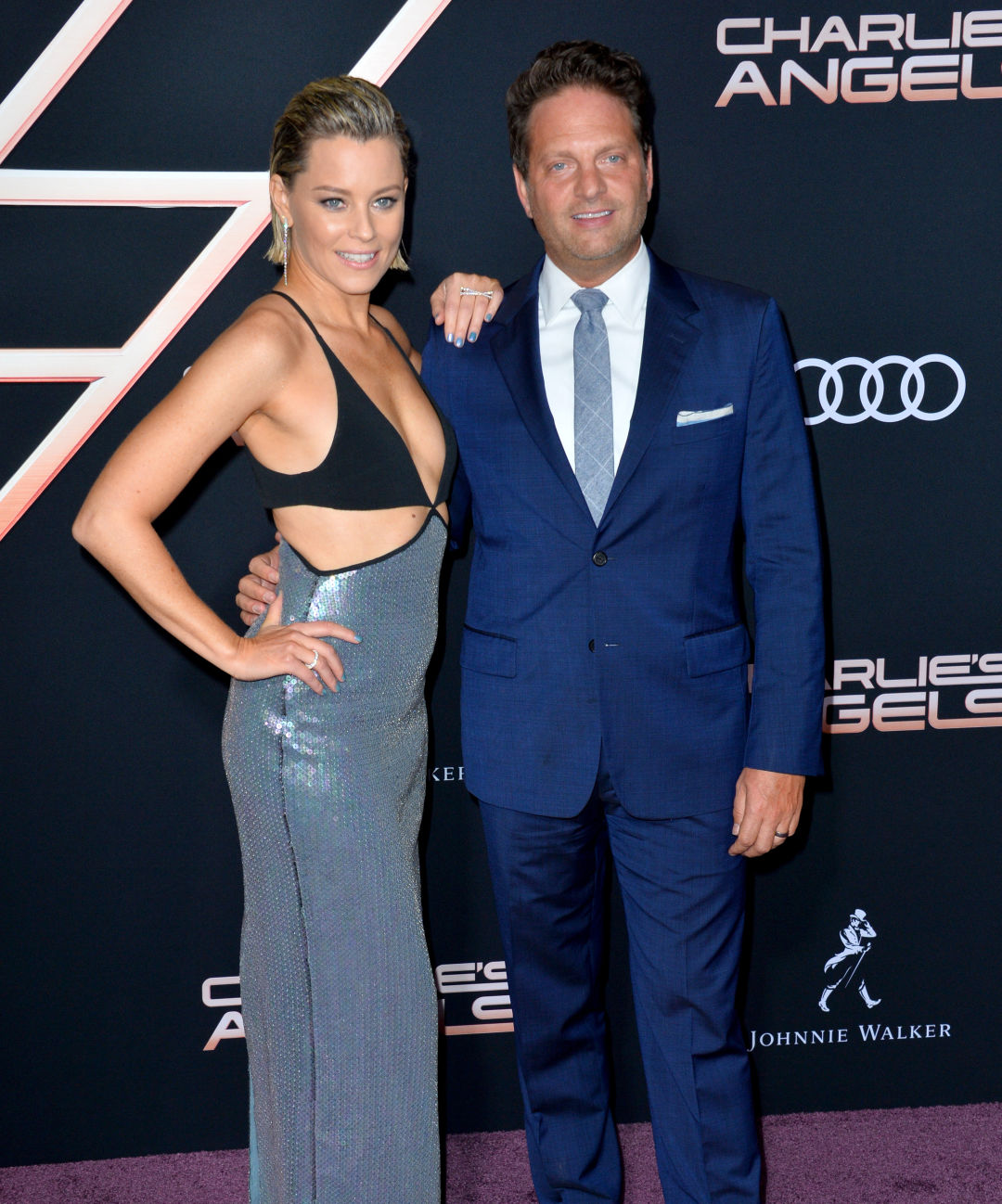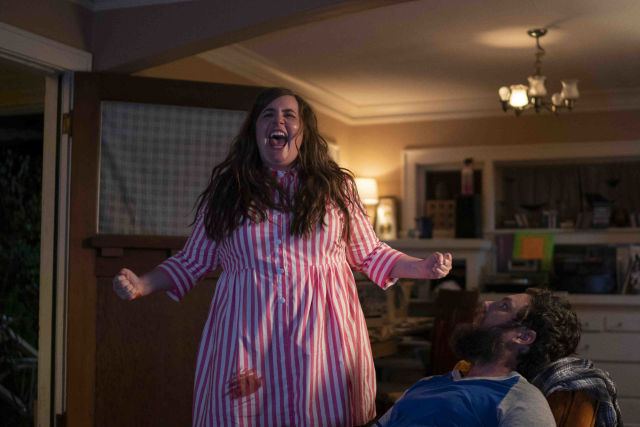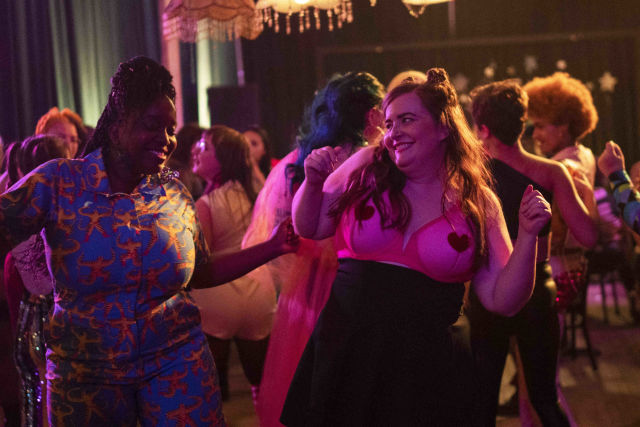Meet the Catlin Gabel Alum Who Produces Shrill

Elizabeth Banks & Max Handelman at the world premiere of "Charlie's Angels" at the Regency Village Theatre.
Image: Paul Smith/Featureflash
Max Handelman is one of eight credited producers on Shrill, the Portland-shot Hulu dramedy based on Lindy West's memoir. He's in good company: heavy-hitters like Lorne Michaels, Aidy Bryant, and Elizabeth Banks (she of spooky pearl-wielding and Brian Wilson-whispering) round out the roster.
Banks, in fact, is Handelman's wife, and the pair has a production company called Brownstone Productions—they're responsible for mega-hits like the Pitch Perfect franchise and less-mega-hits like the recent Charlie's Angels reboot. Handelman grew up in the West Hills, and as it turns out, he was somewhat instrumental in bringing Shrill's production to Portland.
The show's second season dropped on Hulu today, so I caught up with Handelman late last week to talk about its development, his path to becoming a producer, and the 100 percent hard-science reasons that Portland is better than Vancouver, B.C. Below is a transcript of our conversation, lightly condensed and edited for clarity.
Which high school did you attend?
I attended the topical Catlin Gabel.
Were you always angling toward a film/TV career? Or did that interest come a little bit later?
I was not. I think I was always interested in the creative world, whether that be writing or, when I was a little kid, doing claymation. I remember Will Vinton studios—that was a big deal in Portland when I was a little kid. So I was always interested in it, but no, when I went to Penn for college I didn’t even know what Hollywood really was, and had no real aspirations towards it.
What did you study at Penn?
I studied a major I created, political communications. I was very into politics—I still am.
Did you start working on political campaigns right out of college?
No, I didn’t. I fell into a job on Wall Street in investment banking, which is where a lot of Penn grads end up. I always wanted to live in New York. I didn’t take any finance classes at the Wharton school or anything, but investment banking seemed like a good job to have when I was 22 or 23, and so I took that and did that for two and a half years in New York and San Francisco. And then I wanted to leave banking, like a lot of people do, and at this point, Elizabeth was going to New York to pursue her acting career, and I wanted to go back to New York as well, and I got a job with NewsCorp who owns Fox and all of that, so I took a job working in the digital ventures group at NewsCorp during the initial internet Silicon Valley/Silicon Alley gold rush. That was ‘98, ‘99, something like that. That’s how old I am.
So that was my first fairly tangential exposure to the creative world, so to speak. Although I was working as much in torts and that side of the entertainment business as I was in film or television studios. It was much more internet, New York based, acquisitions, that kind of stuff. Not super creative.
So was it just sort of a slow slide into creative ventures from there?
My evolution into Hollywood was fairly atypical. Most people, I think it’s fair to say, start as assistants. Whether it’s starting in the mailroom at an agency, or working at management companies, [or as] assistants in the writer’s room.
I didn’t do that. I went to business school at UCLA after NewsCorp, and after graduating, my wife and I got married and her career started to really take off. And it was the kind of thing where, through our then-evolving Hollywood life, I had a decent amount of exposure to this network of people, and I just realized that I couldn't be an assistant. At this point I was 30 years old, and I was like, "I'll be a terrible assistant, I'll fail at that, it's gonna end badly for a whole host of reasons," so I never went that route, and instead I went and did something even dumber. I said, "You know what? I'm gonna try to be a producer." Which, in hindsight, one of your biggest strengths when you’re younger and just trying to break into an industry is sheer naïveté and stupidity.
Elizabeth's the type of person that knows every single person on the call sheet, knows exactly what every single person does, and while a lot of actors spend a lot of time on set sitting in their trailers doing whatever, she would be on set studying how directors were directing and how producers were producing, and she was just very conversant with agents and executives even at a very young age. So we were able to start with a base of access that a lot of young aspiring producers wouldn’t have.
You give a good portrait of how Elizabeth was fit for this kind of work, but what made you interested in it?
I love the hunt for story ideas and material. I still, to this day, spend a tremendous amount of time looking in dark corners of the internet and old bookstores and old comic book shops. I just love that experience and journey of finding a piece of material that has either not been exposed or has been sitting around and nobody’s been doing anything with.
That’s kind of what led me to making my first real jump into producing. I found this graphic novel called The Surrogates, which was this super cool indie near-future sci-fi graphic novel, and immediately thought, "This would make a really cool, grounded sci-fi film.”
So I was able to get The Surrogates and get the rights to shop it as one of our early pieces of material, and then, as these things do, things break a certain way, and we were able to set it up at Disney through another production company that I was friends with. A friend of mine from college was one of the producers there, and through a very quick order, it was written and on the tracks at Disney, and then Bruce Willis came on to be the lead and the movie got made. It all happened, in Hollywood time, very quickly. Less than 18 months.
And this was the very first thing you tried to get off the ground?
Well, within that time period, my agent had a colleague who had just received a book proposal, and he sent it to me. And he said, “I don’t know what the hell this is, you should check it out though.” And it was the book proposal and the first six chapters of a book. That book was Pitch Perfect. And I saw that, immediately came home, and spoke with Elizabeth.
I was like, “I think the world of a cappella would be a perfect comedy landscape to explore.” We’d gone to Penn where—at the Ivy Leagues, a cappella is a very big thing. So I knew very much what a cappella was, but I also came at it, like a lot of people, from the perspective that it was a little bit ridiculous and a lot of these people take themselves very seriously, but that’s what makes it really funny, and at the same time they’re extremely talented so you do root for them, and the music can be quite good.
Who brought you Shrill?
Oftentimes, books are represented by agents at different agencies, and they get submitted to producers in the hopes of those producers taking them into their respective studio buyers. So I think the book was submitted to us through our then-executive Renate Ratford, who now works at Netflix of course, like everybody.

Aidy Bryant and Luka Jones in the season 2 premiere of Hulu's Shrill.
Image: Courtesy Hulu
But the real champion, the one who immediately saw it as a show and saw the light was Elizabeth. It was absolutely one of those moments where she read the book in one night and just said, “Lindy West is incredible and I wanna meet with her.” And Lindy came in, and Lindy and Elizabeth had—I mean, we were all in the room, but it was the two of them just getting geeked up about the life and the world that Lindy portrays and that character.
What did you, personally, do?
My role was largely supportive and helping move the train along. I’m involved in taking it into Warner Brothers and saying, “I’m really excited about this, we want you to buy the rights to this book so we can develop it for a show.”
So we get the rights to the book, the next question is can we attach any elements to the project to make it, not only creatively, but as a business venture, a stronger package? Aidy Bryant was immediately the idea. So then it’s a question of teeing that process up: speak to her agents, tell them about the book, get them excited about it for her. And on a parallel track, Elizabeth, who knows Aidy from hosting Saturday Night Live, engineers to speak to Aidy directly. Meanwhile, we didn’t know this, but Aidy on her own has heard about the book and is trying to get to us to talk about it.
The third piece to this is that you’re kind of trying to find a writer slash showrunner, and so you’re putting together a list of writer/showrunners that the studio has worked with and/or has deals with. We’re going through lists and looking at different ideas and we’re submitting the book to a few of them. And one of the top people we wanted was Ali Rushfield, who we sent the book to.
The book, obviously, is set in Seattle. Talk me through the process of choosing to shoot and set the show in Portland.
It was a combination of factors. I don’t think this is the overriding factor by any means, but one was me saying, “Hey, it would be kind of cool to shoot this in Portland.”
A lot of it comes down to crew. I can’t speak to Seattle with any specificity, but Portland is generally perceived to have a stronger crew base, as evidenced by the fact that there are usually two or three shows going there, plus all the commercial production out of Wieden and Kennedy, Nike, etc. The truth is that the immediate choice, which often happens, was Vancouver. As you probably know, between the dollar and the tax rebates, Vancouver’s often the desired locale. Portland was fortunate—Vancouver, at that moment in time, was inundated with productions. Warner Brothers, who would be producing the show, happened to have several of their own. So they just knew, they were like, “If we go in and try to crew up a show in Vancouver, we’re gonna really struggle to put together a strong crew.”

Lolly Adefope and Aidy Bryant in season 2 of Hulu's Shrill.
Image: Courtesy Hulu
Creatively, a lot of people were excited not to be going to Vancouver. There are just so many people up in Vancouver, and it’s a further flight from L.A. and all that stuff. So people were really excited about the possibility of Seattle or Portland, and once Vancouver was off the table, Oregon does have some amount of rebates, a stronger crew base, and then I think frankly the big additional factor was we produced this with Broadway Video, Lorne Michael’s company, who had Portlandia going in Portland. Portlandia was ending at roughly the same time that we were crewing up for Shrill, so we were able to roll a lot of the fantastic crew that Portlandia had onto Shrill. So the timing just worked out.
What was the gap between season one premiering and getting picked up for season two?
It was a matter of three or four weeks, if I recall. What Hulu typically does on their shows is say, "We wanna gather x number of weeks of data to determine how well the show is performing and how we’re gonna move forward." But it was quite quick. Oftentimes, with one of these shows, networks or streamers know that they’re gonna move forward with the second season. But yeah, our numbers were strong, the response was strong. But I think more importantly, it was one of those pop cultural water-cooler shows that was just a big conversation on a national level, and that’s exactly what the streamers want: flashy, buzzy, topical shows.
Were you surprised by the response to the first season?
On one hand, I would say with any new show or film that you’re launching, you never really know until it premieres. That said, you sometimes have a feeling. So when Pitch Perfect 2 happened, no one expected that it was gonna open to $69.5 million, which was insane and still is insane. It’s bigger than some Marvel movies. You could feel in the pop cultural water that the anticipation for Pitch Perfect 2 was a real thing: people everywhere were talking about it, and it just had that kind of momentum.
Shrill is on a far smaller scale than Pitch Perfect, but you could still kind of feel that. We premiered at SXSW. Elizabeth and Aidy did a Q&A, and it was overflow capacity. You could certainly feel down in SXSW, which is a very strong indicator of a certain comedy audience, that the anticipation for the show was strong.
I don't know if you're the person to talk about this—it might fall under Ali's purview—but what challenges go into forming a coherent, season-long narrative from a book of essays? There's a fair amount of inventing and stitching and plotting to this show that's not necessarily ripped straight from the book.
Any time you’re adapting a real-life story, and certainly a collection of essays, into a fictional narrative, there’s always a kind of challenge. And it’s a good challenge, not necessarily a negative, but it’s how much do you honor the reality of the characters versus how much are you inventing? And then from there, once the written narratives are complete and the actors begin inhabiting these roles, they then begin taking over their characters through their performance. And, you know, where does Lindy stop and Aidy Bryant’s Annie begin? I think it’s an interesting evolution. And the evolution even over the first six episodes of season one of Annie—she’s growing as a character, which you then see in the second season, which is now entirely fictionalized.
Season 2 of Shrill premiered today on Hulu. Watch the trailer below, and stay tuned for a review next week.




